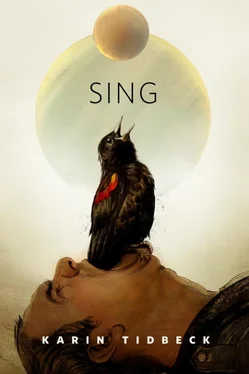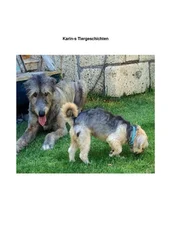
The cold dawn light creeps onto the mountaintops; they emerge like islands in the valley’s dark sea, tendrils of steam rising up from the thickets clinging to the rock. Right now there’s no sound of birdsong or crickets, no hiss of wind in the trees. When Maderakka’s great shadow has sunk back below the horizon, twitter and chirp will return in a shocking explosion of sound. For now, we sit in complete silence.
The birds have left. Petr lies with his head in my lap, his chest rising and falling so quickly it’s almost a flutter, his pulse rushing under the skin. The bits of eggshell I couldn’t get out of his mouth, those that have already made their way into him, spread whiteness into the surrounding flesh. If only I could hear that he’s breathing properly. His eyes are rolled back into his head, his arms and legs curled up against his body like a baby’s. If he’s conscious, he must be in pain. I hope he’s not conscious.
* * *
A strangely shaped man came in the door and stepped up to the counter. He made a full turn to look at the mess in my workshop: the fabrics, the cutting table, the bits of pattern. Then he looked directly at me. He was definitely not from here—no one had told him not to do that. I almost wanted to correct him: leave, you’re not supposed to make contact like that, you’re supposed to pretend you can’t see me and tell the air what you want . But I was curious about what he might do. I was too used to avoiding eye contact, so I concentrated carefully on the rest of him: the squat body with its weirdly broad shoulders, the swelling upper arms and legs. The cropped copper on his head. I’d never seen anything like it.
So this man stepped up to the counter and he spoke directly to me, and it was like being caught under the midday sun.
“You’re Aino? The tailor? Can you repair this?”
He spoke slowly and deliberately, his accent crowded with hard sounds. He dropped a heap of something on the counter. I collected myself and made my way over. He flinched as I slid off my chair at the cutting table, catching myself before my knees collapsed backward. I knew what he saw: a stick insect of a woman clambering unsteadily along the furniture, joints flexing at impossible angles. Still he didn’t look away. I could see his eyes at the outskirts of my vision, golden-yellow points following me as I heaved myself forward to the stool by the counter. The bundle, when I held it up, was an oddly cut jacket. It had no visible seams, the material almost like rough canvas but not quite. It was half-eaten by wear and grime.
“You should have had this mended long ago,” I said. “And washed. I can’t fix this.”
He leaned closer, hand cupped behind an ear. “Again, please?”
“I can’t repair it,” I said, slower.
He sighed, a long waft of warm air on my forearm. “Can you make a new one?”
“Maybe. But I’ll have to measure you.” I waved him toward me.
He stepped around the counter. After that first flinch, he didn’t react. His smell was dry, like burnt ochre and spices, not unpleasant, and while I measured him he kept talking in a stream of consonants and archaic words, easy enough to understand if I didn’t listen too closely. His name was Petr, the name as angular as his accent, and he came from Amitié—a station somewhere out there—but was born on Gliese. (I knew a little about Gliese, and told him so.) He was a biologist and hadn’t seen an open sky for eight years. He had landed on Kiruna and ridden with a truck and then walked for three days, and he was proud to have learned our language, although our dialect was very odd. He was here to research lichen.
“Lichen can survive anywhere,” he said, “even in a vacuum, at least as spores. I want to compare these to the ones on Gliese, to see if they have the same origin.”
“Just you? You’re alone?”
“Do you know how many colonies are out there?” He laughed, but then cleared his throat. “Sorry. But it’s really like that. There are more colonies than anyone can keep track of. And Kiruna is, well, it’s considered an abandoned world, after the mining companies left, so—”
His next word was silent. Saarakka was up, the bright moonlet sudden as always. He mouthed more words. I switched into song, but Petr just stared at me. He inclined his head slightly toward me, eyes narrowing, then shook his head and pinched the bridge of his nose. He reached into the back pocket of his trousers and drew out something like a small and very thin book. He did something with a quick movement—shook it out, somehow—and it unfolded into a large square that he put down on the counter. It had the outlines of letters at the bottom, and his fingers flew over them. WHAT HAPPENED WITH SOUND?
I recognized the layout of keys. I could type. SAARAKKA, I wrote. WHEN SAARAKKA IS UP, WE CAN’T HEAR SPEECH. WE SING INSTEAD.
WHY HAS NOBODY TOLD ME ABOUT THIS?, he replied.
I shrugged.
He typed with annoyed, jerky movements. HOW LONG DOES IT LAST?
UNTIL IT SETS, I told him.
He had so many questions—he wanted to know how Saarakka silenced speech, if the other moon did something too. I told him about how Oksakka kills the sound of birds, and how giant Maderakka peeks over the horizon now and then, reminding us that the three of us are just her satellites. How they once named our own world after a mining town and we named the other moons for an ancient goddess and her handmaidens, although these names sound strange and harsh to us now. But every answer prompted new questions. I finally pushed the sheet away from me. He held his palms up in resignation, folded it up, and left.
What I had wanted to say, when he started talking about how Kiruna was just one world among many, was that I’m not stupid. I read books and sometimes I could pick up stuff on my old set, when the satellite was up and the moons didn’t interfere with it so much. I knew that Amitié was a big space station. I knew we lived in a poor backwater place. Still, you think your home is special, even if nobody ever visits.
* * *
The village has a single street. One can walk along the street for a little while, and then go down to the sluggish red river. I go there to wash myself and rinse out cloth.
I like dusk, when everyone’s gone home and I can air-dry on the big, flat stone by the shore, arms and legs finally long and relaxed and folding at what angles they will, my spine and muscles creaking like wood after a long day of keeping everything straight and upright. Sometimes the goats come to visit. They’re only interested in whether I have food or ear scratchings for them. To the goats, all people are equal, except for those who have treats. Sometimes the birds come here too, alighting on the rocks to preen their plumes, compound eyes iridescent in the twilight. I try not to notice them, but unless Oksakka is up to muffle the higher-pitched noise, the insistent buzzing twitches of their wings are impossible to ignore. More than two or three and they start warbling among themselves, eerily like human song, and I leave.
Petr met me on the path up from the river. I was carrying a bundle of wet fabric strapped to my back; it was slow going because I’d brought too much and the extra weight made me swing heavy on my crutches.
He held out a hand. “Let me carry that for you, Aino.”
“No, thank you.” I moved past him.
He kept pace with me. “I’m just trying to be polite.”
I sneaked a glance at him, but it did seem that was what he wanted. I unstrapped my bundle. He took it and casually slung it over his shoulder. We walked in silence up the slope, him at a leisurely walk, me concentrating on the uphill effort, crutch-foot-foot-crutch.
Читать дальше













